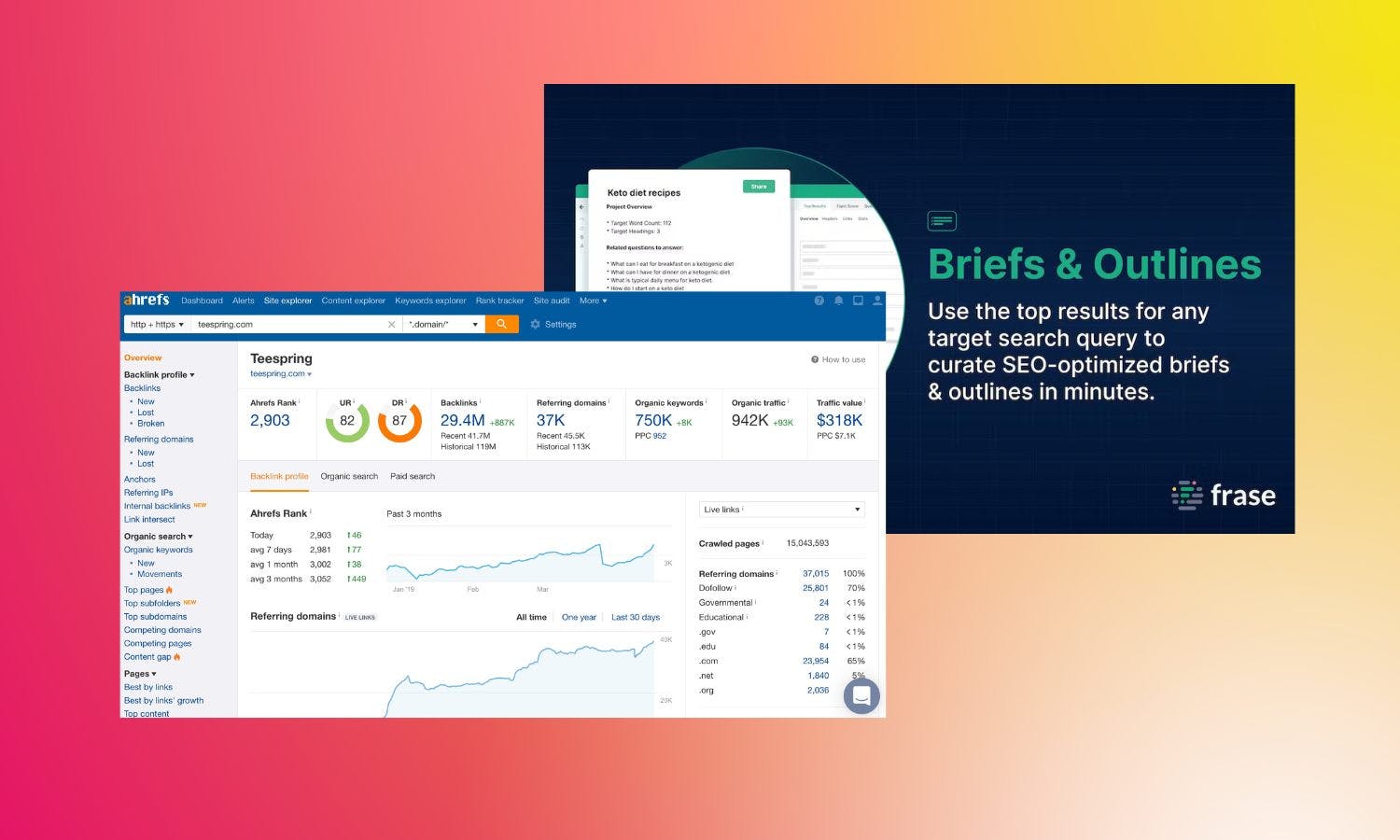AI is a key component of search engine algorithms including Google’s RankBrain and BERT, and many SEO products are now integrating the technology into their platforms. SEO techniques have long been used to improve a website’s visibility on search engine results, with the use of tooling an essential part of the process.
They can help you identify popular keywords, aid in optimizing your content and, in some cases, improve the user experience of your website by suggesting changes and improving page loading speed.
AI-based copywriting assistants are now also being integrated into some of the most popular SEO tools on the market to help speed up productivity. (See our guide to Jasper.AI vs Copy.AI for detailed analysis on two popular apps in this area)
When selecting an AI SEO tool, look for one that offers a free trial or a set of tools to try out in advance. This way, you can test out the tool and make sure it meets your needs before committing to a purchase. Any SEO tool should be easy to use and understand, with the ability to identify opportunities for improvement and offer advice on how to best optimize your website.
With ten years of SEO content experience and a keen interest in discovering the best AI apps for making our lives easier, I’m sharing some of my favorite tools I’ve extensively used and tested. Let’s see which ones made the grade.
Best AI SEO tools 2023
1. Yoast SEO
Best for optimizing SEO content

Yoast SEO
Pros: Great range of technical and content features, Plugin integration makes it easy to use within the CMS
Cons: Requires WordPress, Some features can be can hard to find
Features: Content optimization using focus keywords, redirect functionality, internal linking tools, permalink cleanups, social previews
Cost: Free, Approx $123/year for Premium, Approx $284/year for a subscription
Yoast SEO remains one of the most impressive optimization tools on the market thanks to its range of features that not only helps users optimize their content, but includes some technical features too. One of the best examples of this is just how easy Yoast makes it to set up a canon URL to avoid duplicate content, for example. You don’t need to know any code, you simply add a URL to a box. Yoast can even automatically detect when it’s been added but isn’t necessary.
It’s this balance between content and technical SEO features that makes Yoast SEO the best all-in-one optimization tool on the market, whether you’re just starting out or a pro. It can automatically add structured data, redirect your URLs, clean up your permalinks, and help with internal linking structure, all while providing clear content optimization functionality within the CMS.
It’s typically very easy to use, with clear instructions on how to improve readability, link structure and titles, once a focus keyword or two is inputted. Plus the inclusion of Bertha, an AI-based writing assistant, makes copywriting even easier.
Where Yoast goes that extra mile is the ability to not only optimize your meta title, but your social media titles as well, an unexpected addition for a plugin that focuses on SEO. You might have to dig around or hit an extra button to find some of that core functionality though. Not to mention that Yoast SEO only integrates with WordPress.
Read Yoast SEO reviews from our community
2. SurferSEO
Best AI SEO tool on a budget
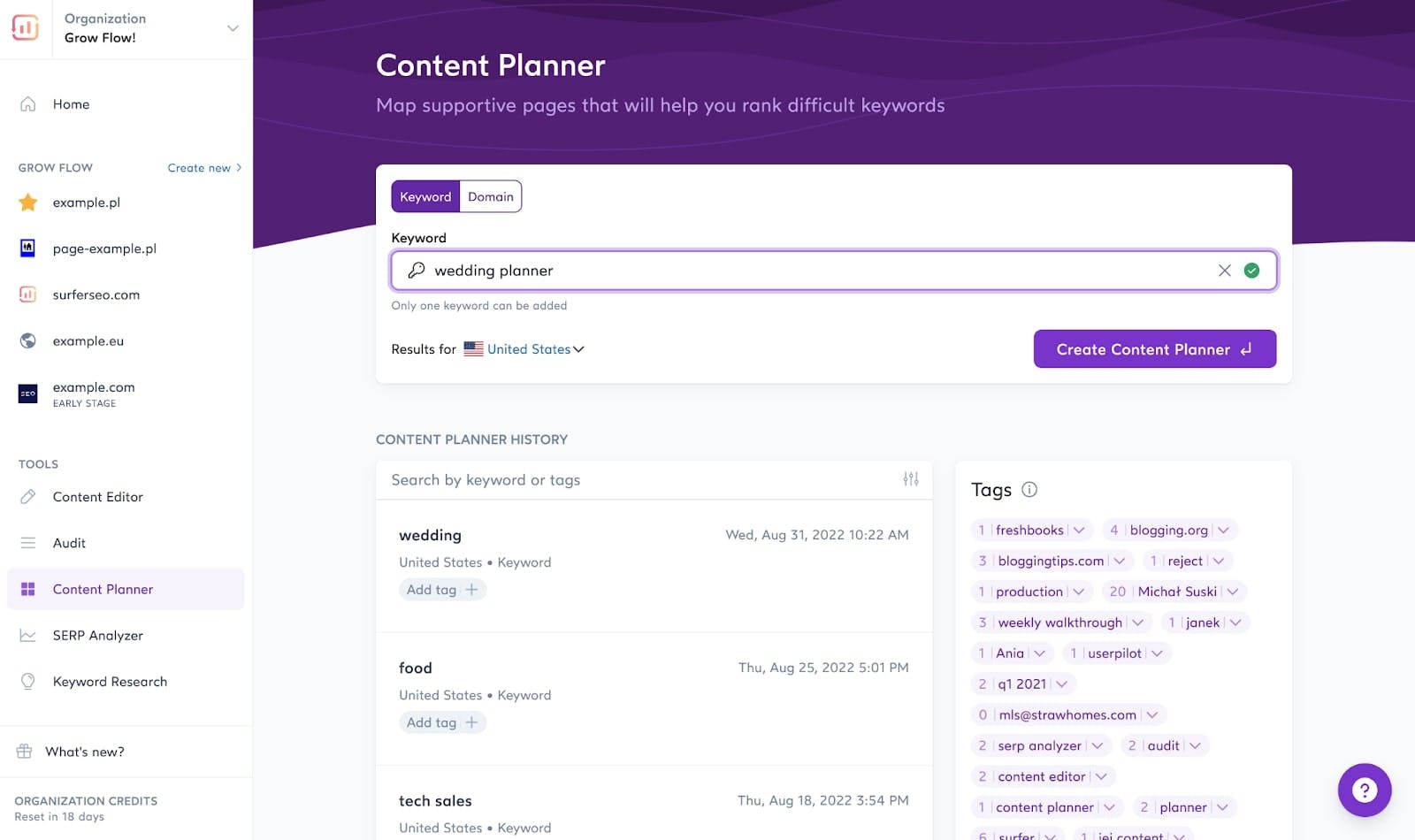
SurferSEO
Pros: Clear interface for SEO optimization, Great pricing plans, Great free tools
Cons: I’d tend to rely more on Ahrefs or SEMRush as my primary source of detailed keyword research
Features: Content Editor, Keyword research, Audit, AI-growth platform, AI outline generator, Surfer extension
Cost: From $19-$249 per month, some free features available
Arguably, SurferSEO provides one of the clearest interfaces for optimizing your content. Its color-coded content score gives you an at-a-glance look at how your content may perform on SERPs, making it a bit easier to use than some other optimization tools. Plus, it works outside of WordPress directly into Docs, making it a good option to consider when YoastSEO is simply not an option.
It also features a suite of keyword research features with a clear, nice interface. Impressively, like SEMRush, it also includes the ability to select keyword by user intent and you can explore keyword difficulty and volume, but when it comes to an all-in-one SEO solution, you’re probably going to look to Ahrefs or SEMRush if you’re a larger business to provide the best data.
If you’re a small blogger or on a strict budget, however, SurferSEO really provides excellent value for money, starting at a mere $19 per month to use the Content Editor. For $69 you access all features which includes some neat use of AI.
Grow Flow gives you personalized recommendations designed to maximize your SEO efforts through content, keywords and internal links. I personally love some of the free tools available here including the Surfer extension which turns Google itself into a keyword research platform and the AI outline generator can be useful too.
Read Keyword Surfer reviews from our community
3. SEMrush
Best all-round SEO tool for content writing features
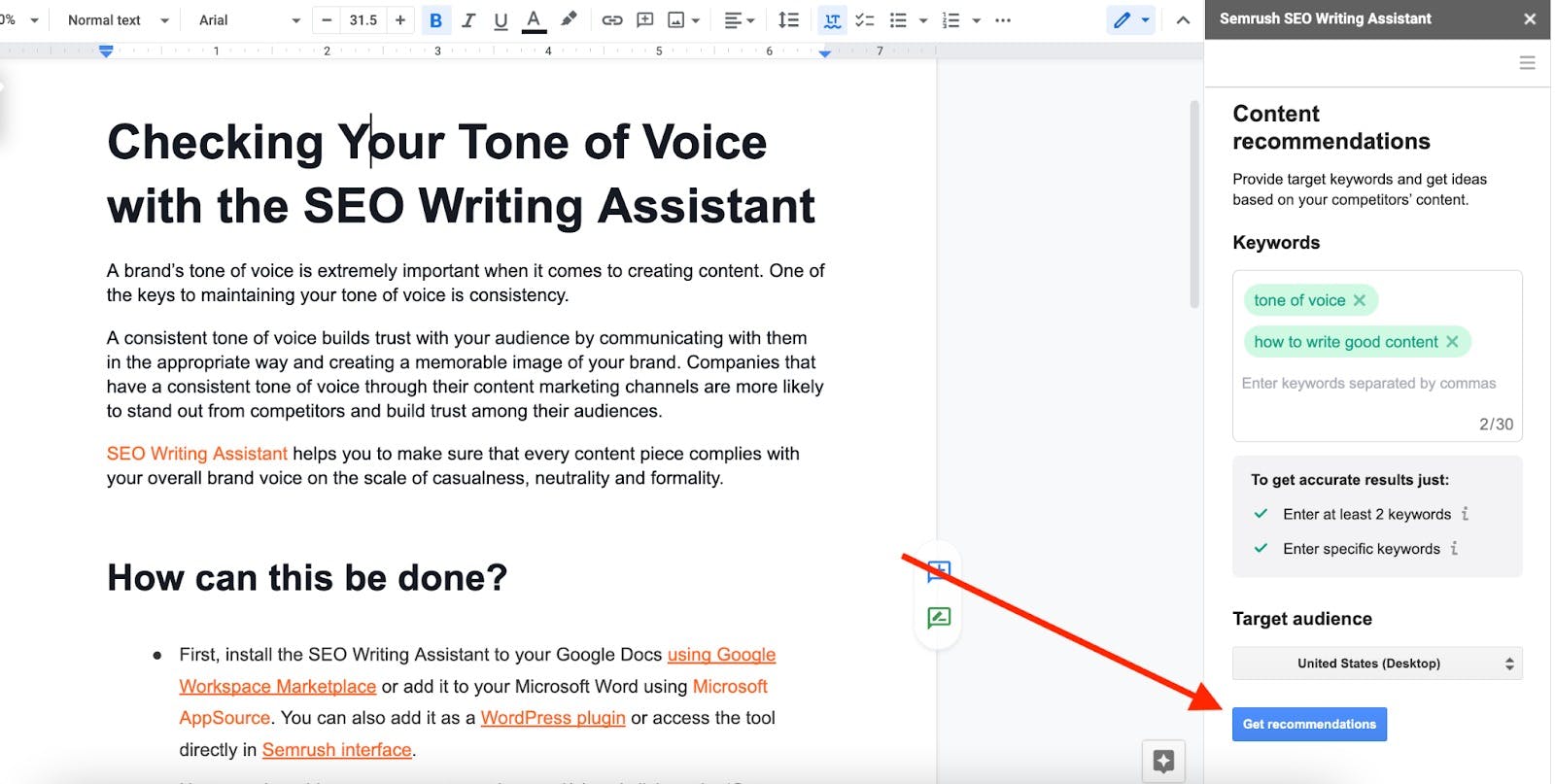
SEMRush
Pros: Great all-round features to assist in multiple areas of SEO, Good content writing assistance, multiple pricing plans
Cons: Competitor Ahrefs can be considered more comprehensive in certain areas, content writing functionality is restricted according to pricing plan, Writing Assistant could be clearer
Features: Keyword research, Competitive research, Link building, Site audits, PPC features
Cost: $119 monthly for Pro plan, $229.95 monthly for Guru plan, $449.95 monthly for Business plan
SEMrush is an all-in-one SEO tool that provides a vast suite of keyword research, backlink analysis, and site auditing tools, making it a great option if you’re only looking to spend on one tool. (Although I’d recommend using several as there’s plenty of fantastic free SEO tools you can use too regardless of budget)
Like its closest competitor Ahrefs, SEMrush offers detailed keyword research opportunities, including the ability to conduct research on your closest competitors and gain a clear understanding of search volume, intent and keyword difficulty. Both tools offer excellent features, including backlink analysis, position tracking and technical audits making them fairly evenly matched but SEMrush is usually regarded as best for PPC and for offering helpful content writing features, including a few in the AI department.
SEO Writing Assistant helps you optimize your content for better search engine rankings both within the platform itself and as an add-on in apps such as Google Docs. It offers readability, SEO, Originality and Tone of voice metrics. What’s particularly helpful about the platform’s writing assistant is that you use it in conjunction with the tool’s SEO Content Template feature which provides a list of related keywords you can use alongside the primary keyword. It automatically pulls in this information for you from Docs and you can view these keywords at any time from the SEO panel.
SEMrush now also offers the ability to compose and rephrase with AI too, as well as offering a further app to its app center called Copymatic’s AI Writing Assistance. Be aware, however, that these can include an additional cost, while the AI functionality included in the Writing Assistant itself will only allow you to generate up to 1000 words using the platform’s popular Guru pricing plan.
Read Semrush reviews from our community
4. Ahrefs
Best all-round SEO tool for data and auditing
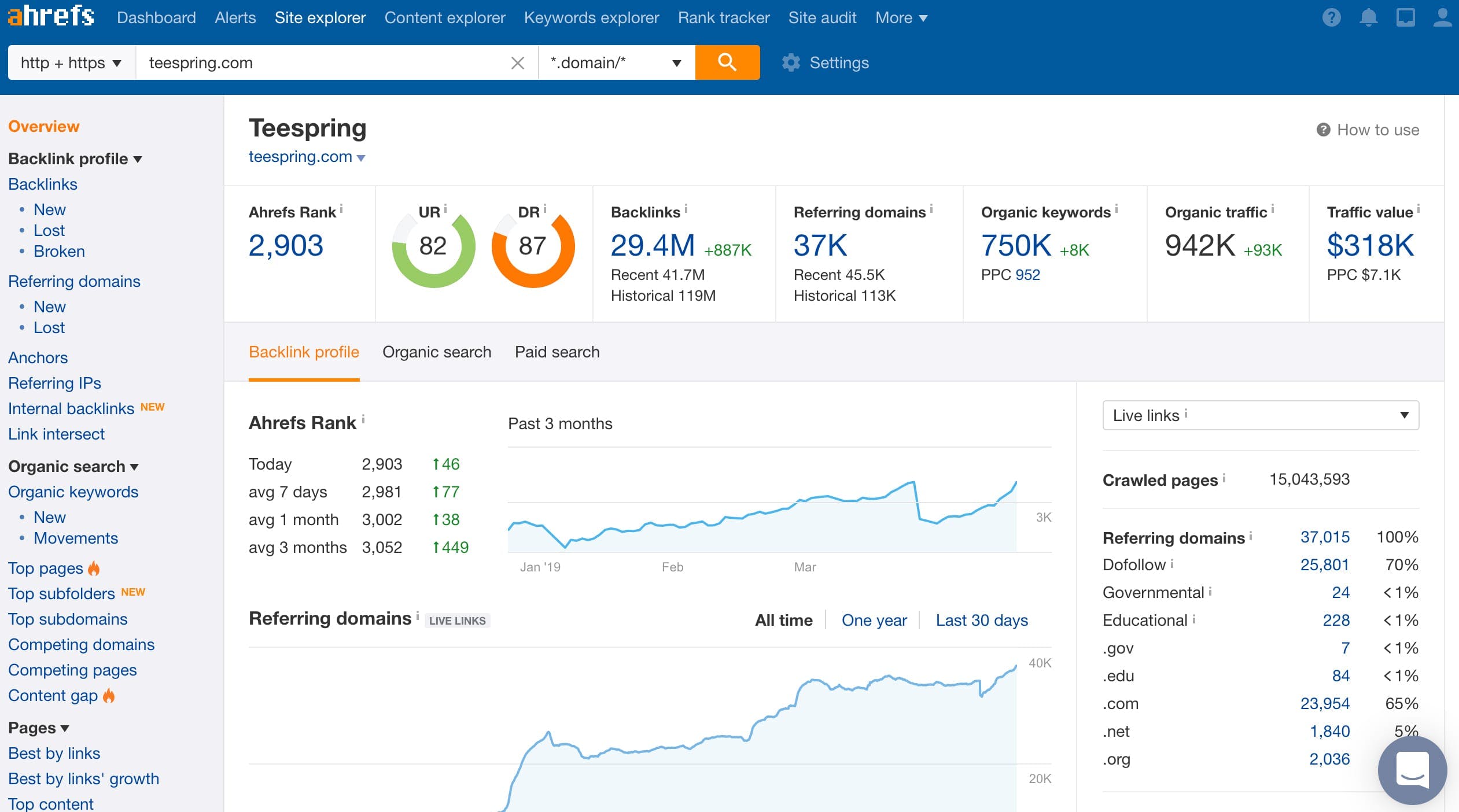
Ahrefs
Pros: Great all-round features to assist in multiple areas of SEO, multiple pricing plans, Great competitor research data, advanced auditing
Cons: Close competitor SEMrush includes PPC and more content writing features if that’s important to you, No free trial, May be overwhelming for beginners
Features: Keyword research, Competitive research, Link building, Site audits
Cost: From $98 to $993 approx for plans
Ahrefs is one of the most powerful SEO tools out there, featuring a wealth of impressive features including comprehensive backlink analysis, robust keyword research, site auditing, content analysis, and competitive analysis. If you’re looking to invest heavily into one tool, it’s difficult to look beyond Ahrefs as a highly trusted brand in the industry.
Its keyword research functionality is clear and comprehensive, with the ability to provide data not just for Google but across several sources, including YouTube and Bing. You can’t get much better than the tool’s benchmarking and competitor analysis, while the platform’s auditing features allows you to extensively uncover your website’s technical and on-page SEO issues.
While SEMrush has arguably utilized more AI content features, Ahrefs does include a tool called "Content Explorer" that helps you find popular content in your industry and analyze its performance.
Read Ahrefs reviews from our community
5. Frase
Best for generating content outlines
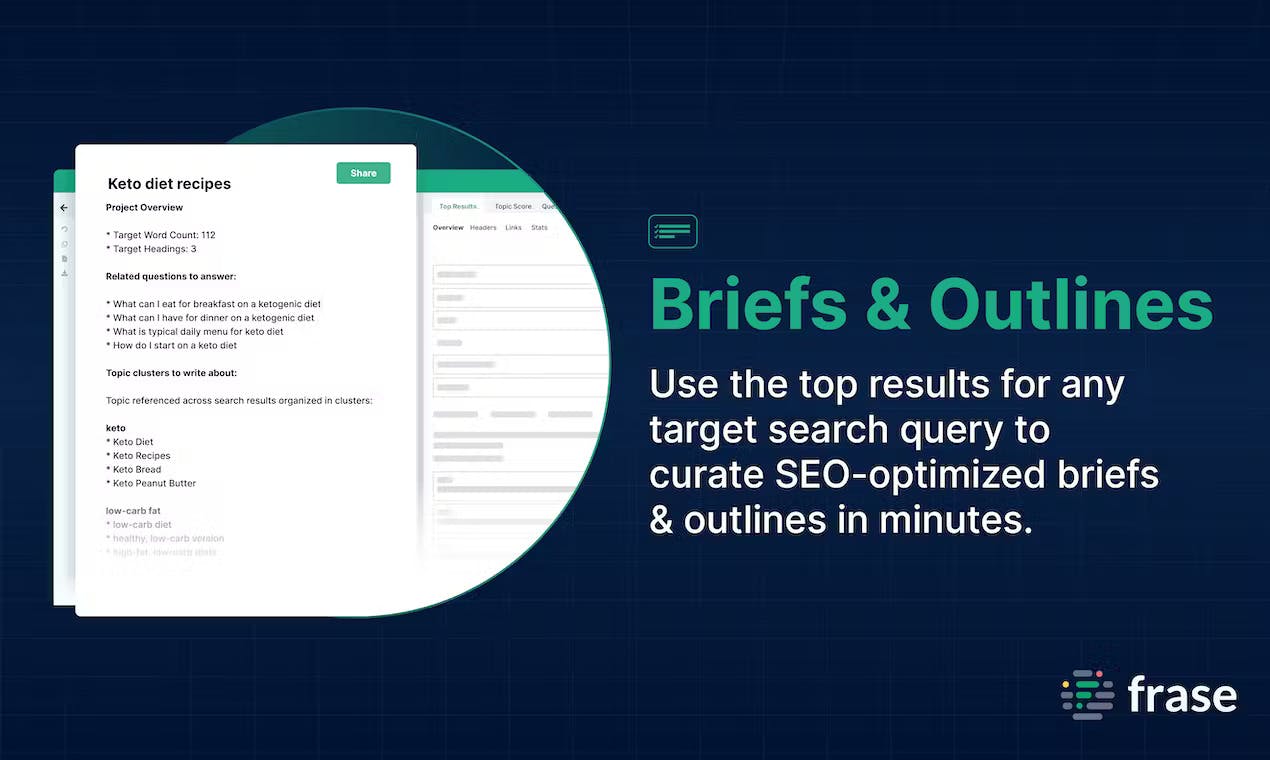
Frase
Pros: Quick and easy to use, saves time spent on a common content task
Cons: No free trial
Features: AI content generation, WordPress plugin, Brief generator
Cost: From $14.99 to $114.99 per month
When it comes to the SEO content writing process, not only are you dealing with a whole lot of words and the initial keyword research, you’ll want to ensure the articles are on-point. That’s where Frase can help.
One of the best features of the platform is its ability to generate content briefs in a matter of 6 seconds. Rather than spending all your time pouring over the SERPs looking for exactly what you need to include, Frase uses the top results for any target search query to curate SEO optimized briefs and outlines.
In addition, it can also save time during the writing process by leveraging AI to write copy for you at the click of a button, and there’s a number of useful tools available to make other parts of the process easier too.
The platform can scrape Google’s People Also Ask feature for you, or even help generate meta descriptions. One drawback is the platform doesn’t feature a free trial per se, there’s a small cost to try it out, but if you are interested you can test run some of the tools for free via the Frase website.
Read Frase reviews from our community
6. MarketMuse
Best for content planning

MarketMuse
Pros: Free plan available, Strong focus on topic clusters
Cons: Pricey, other all-round SEO tools are available
Features: Content briefs, Content editor, Competitive content analysis, Topic clusters
Cost: Free plan, From $149/ month to $399/month
MarketMuse is an AI-based tool that helps you identify gaps in your content and provides suggestions for new topics and keywords to target. If you’re looking for a tool to specifically plan all aspects of content production and make it that bit easier, then there’s a good few useful features here for content strategists looking for a top level view.
One way MarketMuse offers insights and helps its users make more objective decisions about content is by strongly focusing on clustering topics together to create a series of interconnected pages. It’s worth noting that this is something that all-round SEO tools such as Ahrefs and SEMrush also encourage, but MarketMuse focuses on in significant detail.
The tool features a Topic Navigator and Keyword and Cluster Research to help research around a topic, while the Heatmap functionality can be used to determine how well your competitors are covering those topics. One further strength of MarketMuse is that it focuses on structure of content itself which can be overlooked when using an all-round SEO tool. The SERP X-Ray feature is useful for showing how top ranking sites structure their articles and there’s a content brief generator too as a nice time saver.
Of course, it all comes down to budget. With other all-round SEO tools available, it’s easy to overlook a specific tool that focuses so specifically on content processes.
Read MarketMuse reviews from our community
Which AI SEO tool is best for you?
Picking the best AI SEO tool for you depends on your individual needs so we’ve broken down each by sub-category.
If you’re looking for a comprehensive all-in-one tool that has full functionality beyond content features, you’ll want to consider an industry-leading tool like Ahrefs or SEMRush, but if you’re a small blogger on a budget and mainly focus on content specifically, SurferSEO is worth exploring. Be sure to examine each sub-category if you have a specific requirement, such as the need to generate SEO article outlines.
What makes a great SEO AI tool?
Ease of use - Is it easy to source the data from the platform or optimize your content using the tooling?
Features - Does it contain optimum features for comparing keywords, analyzing competitors and auditing your website? How well do the features perform in achieving your end goal and what is the data quality like?
Time-saving - If you’re using an AI feature you want it to speed up productivity with good results not cost you more time in rewrites.
How we tested AI SEO tools
I’ve used multiple tools featured on this list over many years, with some still used by myself today. In addition, I downloaded some of the specifically newer AI features to give them a try, such as AI writing assistants where I hadn’t previously encountered them.
